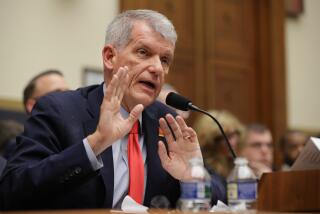Enron Chief Relinquishes Severance Pay
- Share via
Enron Corp. Chief Executive Kenneth L. Lay on Tuesday waived a severance payment of at least $60 million due him when Dynegy Inc. completes its expected acquisition of Enron next year, company officials said.
The potential payment, disclosed in a Securities and Exchange Commission regulatory filing Tuesday, would undoubtedly have sparked additional controversy, given Lay’s primary role in the sharp fall of Enron’s stock and worsening financial condition, which led to the Dynegy deal.
The payment would have been one of the biggest rewards for failure in corporate history, said Graef Crystal, a leading compensation expert.
The payment would have topped the nearly $40 million Mattel Inc. paid former Chief Executive Jill Barad after she was ousted in 2000 after spending $3.6 billion to purchase a money-losing software business the company eventually gave away to a technology group in return for a slice of future profit.
It would have been almost double the $35 million in severance collected by former Xerox Corp. Chief Executive Richard Thoman when he was fired in May 2000 after a disastrous reorganization of the copier company’s sales force.
According to Enron spokeswoman Karen Denne, Lay spoke to a number of employees Tuesday and “decided that the best course of action would be for him to waive his right to payment.”
“Instead,” Denne said, “the combined company would decide the best use of those funds.”
Lay and Enron have run into a storm of criticism in recent weeks after the disclosure of a series of partnerships and the dismissal of several top executives who invested in those ventures.
News of the partnerships and their losses forced the Houston-based company to restate its earnings last week, reducing corporate profits over the last four years by $586 million, or about 20%, to $2.3billion.
Shareholders have filed a series of lawsuits against Enron, charging the company with failing to disclose key information about its operations and financial structure.
The negative disclosures sparked a cash crunch and threatened Enron with collapse until it was saved by an agreement Friday to be acquired by Houston-based Dynegy for $9 billion.
Shareholders have watched the value of Enron shares decline almost 90% from a high of nearly $90 on Aug. 23, 2000. Its shares closed Tuesday at $9.98, up 74cents, on the New York Stock Exchange.
CEO Already Reaped
$150 Million in Options
According to the regulatory filing, Lay stood to collect $20.2 million a year, plus certain extraordinary tax expenses, for each of the full years remaining on his contract once the company was acquired.
If the Dynegy deal is completed as expected next year, Lay’s payment would have totaled at least $60.6 million. His contract ends on Dec. 31, 2005.
Lay already reaped about $150million in stock option gains the last two years alone. Those gains were in part made possible by rosy Enron profit statements, which the company restated downward last week, Crystal said.
“It is a good move to waive the payment,” Crystal said. “But that’s just the down payment on what he should give back. There is probably another $100 million in option profits he should give back. Had they correctly stated the books, the stock would not have risen as high and he would not have made as much from exercising his stock options in the company.”
A stock option gives the holder the right to purchase a share of a company at a predetermined price. Options are a common executive pay incentive, allowing the individual to purchase and sell the shares, pocketing the gains in their appreciation. Lay made $123 million off such transactions last year and $26 million this year, Crystal said.
Lay since 1989 has had a “change of control” clause that awards him a special payment if Enron changes hands. The company described the clause as a standard part of executive employment agreements common to many companies.
Some Wall Street analysts said the liability for the payment would be Dynegy’s problem at the point the merger is completed. Enron shareholders already have suffered all the damage they are going to see.
“Enron has clearly lost the vast majority of its shareholders over the last six months with its piecemeal disclosure, destruction of shareholder value and loss of credibility,” said Andre Meade of Commerzbank Securities in New York.
John Sousa, a spokesman for Dynegy, said the company was aware of the severance clause and had factored the expense into its acquisition, which “we believe is a very strong financial transaction” regardless of the potential payment to Lay.
More to Read
Inside the business of entertainment
The Wide Shot brings you news, analysis and insights on everything from streaming wars to production — and what it all means for the future.
You may occasionally receive promotional content from the Los Angeles Times.











